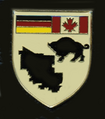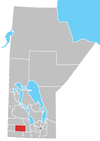CFB Shilo
CFB Shilo Shilo (Flewin Field) Heliport ASU Shilo | |||||||||||
|---|---|---|---|---|---|---|---|---|---|---|---|
 CFB Shilo in 1987 | |||||||||||
| Summary | |||||||||||
| Airport type | Military | ||||||||||
| Owner | Government of Canada | ||||||||||
| Operator | DND | ||||||||||
| Location | Shilo, Municipality of North Cypress – Langford / Municipality of Glenboro – South Cypress | ||||||||||
| Built | 1932 | ||||||||||
| In use | 1910 | ||||||||||
| Commander | Lieutenant-Colonel D.R. Cronk | ||||||||||
| Time zone | CST (UTC−06:00) | ||||||||||
| • Summer (DST) | CDT (UTC−05:00) | ||||||||||
| Elevation AMSL | 1,225 ft / 373 m | ||||||||||
| Coordinates | 49°48′N 099°38′W / 49.800°N 99.633°W[1] | ||||||||||
| Website | http://www.army-armee.forces.gc.ca/en/cfb-shilo/index.page | ||||||||||
| Map | |||||||||||
| Helipads | |||||||||||
| |||||||||||
Sources: Canada Flight Supplement[2] | |||||||||||
Canadian Forces Base Shilo (CFB Shilo; French: Base des Forces canadiennes Shilo — BFC Shilo) is an operations and training base of the Canadian Armed Forces, located 35 km (22 mi) east of Brandon, Manitoba and adjacent to Sprucewoods.[2][3] During the 1990s, Canadian Forces Base Shilo was also designated as an Area Support Unit, which acts as a local base of operations for south-west Manitoba in times of military and civil emergency.
It is located at the very south-west corner of the Municipality of North Cypress – Langford,[4] and the very northwest corner of the Municipality of Glenboro – South Cypress. Additionally, it lies adjacent to the eastern border of the Rural Municipality of Cornwallis. The base has an 18-hole golf course, which hosts numerous military and civilian golf events.
History and demographics[edit]

CFB Shilo has been a training facility for the Canadian Army since 1910,[5][3] and saw an increase in its use as a training facility following the outbreak of World War I. The base is also home to the Royal Canadian Artillery Museum and many artillery pieces are on display including a cannon used at the North-West Rebellion.[6]
The principal purpose of this base is for training in artillery and munitions, activities audibly recognized, though not begrudged, by generations of nearby residents. In 1942, training of the 1st Canadian Parachute Battalion was transferred here from Fort Benning, Georgia and RAF Ringway in the United Kingdom.[7] The existence of the base has enhanced the economic stability of the surrounding area through contracted employment with the Department of National Defence, and provision of off-base services to staff and trainees. CFB Shilo provides employment for approximately 1,400 military personnel,[5] as well as an additional estimated 450 civilian personnel. The base is located within the federal electoral district of Brandon—Souris.
Geographic/geological significance[edit]

The landscape in this area is particularly well suited to these operations. The rolling hills are well suited to hidden target firing drills. Soil compositions of loose sand/gravel aggregates are also ideal for artillery and munitions training. The lack of surface bedrock outcropping greatly reduces the chances of hazardous ricochets during live-fire exercises and also assists in the safe retrieval and secure disposal of both detonated and un-detonated ordnance.[8]
Units[edit]
CFB Shilo is the home to the following operational units:[3]
- 1st Regiment, Royal Canadian Horse Artillery
- 2nd Battalion, Princess Patricia's Canadian Light Infantry
It hosts the following detachments supporting 3rd Canadian Division:
- 3rd Canadian Division Training Centre, "C" Company Shilo[9]
- 1 Military Police Regiment, detachment Shilo.[10]
- 11 CF Health Services Centre
- 3rd Canadian Division Support Group Signal Squadron, detachment Shilo
-
Shilo Training Area Command badge showing the connection with Germany
External connections/partnerships[edit]
Throughout the years both Regular Forces and Primary Reserve troops have trained at CFB Shilo. Troops from other countries, such as Germany, France, Denmark and the United States, have used the area for training. In particular the German Army Training Establishment Shilo has, from 1974 to 2000, trained in excess of 140,000 troops.[11]
CFB Shilo has also seen use by Royal Canadian Mounted Police officers and employees of the Manitoba Department of Corrections.[3]
Transportation[edit]

The base is 8 kilometres (5.0 mi) south of the Trans-Canada Highway on PR 340.[9] There were two heliports associated with the base. Shilo Heliport TC LID: CKM3 was located on the base while Shilo (Flewin Field) TC LID: CKN9, was located 1.1 nautical miles (2.0 km; 1.3 mi) south at |49°46′51″N 099°38′20″W / 49.78083°N 99.63889°W.[2]
Royal Canadian Artillery Museum[edit]
The Royal Canadian Artillery Museum is the only museum in the world that explores the history of Canadian gunners who served Canada since 1855. Established in 1962 at CFB Shilo and provides a national portrait of Canadian gunnery. It includes more than 65,000 artifacts, including more than 150 artillery pieces and vehicles.[12]
Financial information[edit]
CFB Shilo expends $105 million yearly in salaries and purchases, has 1,350 military people and employs 350 civilians.[13] Having a population of 1,700 people
References[edit]
- ^ Location is for the now closed heliport. Other data is for Shilo (Flewin Field) Heliport
- ^ a b c Canada Flight Supplement. Effective 0901Z 16 July 2020 to 0901Z 10 September 2020.
- ^ a b c d Canadian Forces Base Shilo
- ^ Town of Carberry
- ^ a b CFB Shilo Facts
- ^ Travel: Museum tells the story of Canadians who served their country at war
- ^ "1st Canadian Parachute Battalion, 6th Airborne Division". Archived from the original on 6 January 2009. Retrieved 26 October 2018.
- ^ Canadian Forces Base Shilo
- ^ a b 3rd Canadian Division Training Centre
- ^ 3rd Canadian Division - Western Canada
- ^ "History of Canadian Forces Base Shilo". Archived from the original on 9 May 2010.
- ^ Royal Canadian Artillery Museum
- ^ CFB Shilo Overview
External links[edit]
- Department of National Defence - CFB Shilo
- The Royal Canadian Artillery Museum - CFB Shilo
- CFB Shilo presentation — CAF Connection





